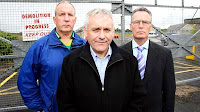
Last Monday night, BBC1 NI broadcast the documentary Breakout at 9pm. You can still catch it on iPlayer for a few more days. The programme tells the story of the Maze Prison escape back in September 1983.
Twenty five years ago I was living in Lisburn and just starting P7. Class mates lived a few hundred yards up the road from the Maze prison, and came into school the next morning with tales of prisoners and/or police running through their back gardens. Even at that young age, there was a sense of the terror and danger associated with the break out.
The story was told primarily from the viewpoint and through the voices of three of the IRA inmates who had led the jail break - Bobby Storey, Brendan ‘Bik’ McFarlane and Gerry Kelly. Being a documentary and not a current affairs investigation, they told their version of the story, unchallenged.
An alternative thread was woven through the prisoners narrative as former prison officer Campbell Courtney provided his perspective. He was shot as he chased the escapees into the surrounding countryside. And the film ended as the camera poignantly panned past the gravestone of Jimmy Ferris, the prison officer who died from a heart attack after being stabbed during the escape. There was a human cost to the escape.
To me it felt like there was a element of romanticism to the tale. And there were some details and much background left out. (Like how the guns got inside the Maze, and why the prisoners were there in the first place. The effect on the lives of local residents who were forced at gunpoint to harbour the runaway prisoners.)
In a way it made it all the more authentic. Those mounting the escape saw the prison officers as the enemy; they sucked up to the screws (the BBC used the phrase “embarked on a strategy of false friendliness with prison staff”) in order to get more freedom and access to gather information to aid their escape. Republican prisoners with their political designation and ideals saw themselves as the victims. Not a view or perspective shared by everyone. But still, their view at the time, as it is now twenty five years later.
The backlash on the Nolan radio show the next morning and the reaction in Wednesday and Thursday’s Newsletter front pages is a reminder that Northern Ireland does and will struggle with hearing about its past.
At last year’s Queen’s Festival, we went to see the powerful play Truth in Translation at the Lyric theatre. And then I read David Park’s excellent novel The Truth Commissioner.
Both works make clear that there are multiple perspectives on any conflict and any incident. And like the Gospel narratives, at times the jigsaw pieces will not easily come together. They will rub against each other, partially contradicting, with different emphasis, different interpretation, defining and offering up as many narratives as people and communities.
Dealing with our past is not going to be easy. And it’s not going to be straightforward. The physical and emotional pain will remain raw, and may even resurface where time has offered balm and healing. But it will not be possible to construct a single version of any story that all parties - or even someone independent - will be able to agree on. (Not even public enquiries manage that! They too conclude with an element of doubt about aspects of the event being forensically examined.)
Monday night’s documentary and the reaction to it is perhaps a glimpse of what might face Northern Ireland in the years ahead. The Eames/Bradley group are due to report in the Autumn. Maybe the governments and Stormont will seek to ignore their report? But if the group does suggest ways of dealing with our past, and if those opportunities for telling the stories of history are taken up, we’ll all have to breath in deeply and swallow hard as we listen to uncomfortable, harsh, romantic and surprising tales.
But might it help us breakout from our past?
1 comment:
Alan,
You have written a very fine, balanced piece here. Let's hope that these kind of event will become so long ago that generations will emerge without direct experience of violence at close hand and maybe then a long-term constitutional compromise will emerge. As the disfunctional situation with the executive at Stormont demonstrates the current settlement is not really stable enough and the sectarian headcount is still as important as ever.
Post a Comment